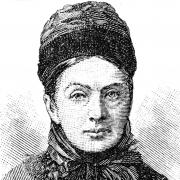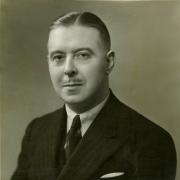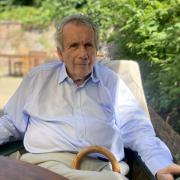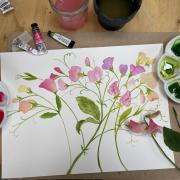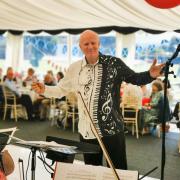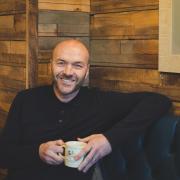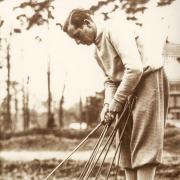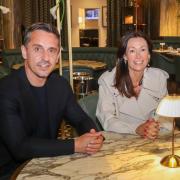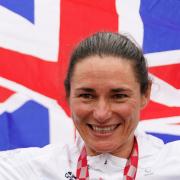For 100 years, the Green Room Theatre Wilmslow has produced award-winning community theatre, created by people from the town and enjoyed by generations.
But as much as they love the smell of the greasepaint and the roar of the crowd, its members agree their favourite element of the Chapel Road theatre is the friendships they’ve found along the way.
President David Reynolds explains: ’We’re all from different backgrounds. We have different lifestyles, but if anything happens to anybody as a member, we all rally around.
‘I have thoroughly enjoyed so many shows here, but the thing that sticks out most is the friendships I’ve made.’

‘As David says, we all have different lifestyles and different backgrounds. Nobody gives a hoot about that. It’s just people coming together and having fun for a few hours. And when things in life have been difficult, I could not have asked for more from people within the society, and the support that they gave me. There’s something special about this place, everyone who comes here feels it.’
David is celebrating his 60th season, and in that time he’s acted in more than 70 productions. ‘I'd wanted to be an actor since I was at school,’ he says. ‘In those days, we didn't have drama colleges up here. You had to go down to London. At that stage, I think, there were 18,000 members of Equity, of which 14,000 were out at work at any one time. So the opportunity of playing in community theatre, while pursuing another career, was ideal for me, and it still is.
‘I play parts professional actors would have given their eyeteeth for. I’ve played David in Crown Matrimonial; we had so much fun with Private Lives, and then we did Shakespeare at Gawsworth Hall each summer, which meant some of the best roles of all.’

David played Sir Andrew Aguecheek, the hapless aristocrat who ends up bankrolling Sir Toby Belch’s disastrously debauched outings and wishing he’d stayed at home.
It was a roaring success – so much so they were asked to return the following year, and again every summer up until 2016, when the hall changed its outdoor entertainment format.
’Performing Shakespeare at Gawsworth Hall was something I’ll never forget,’ recalls David. ‘We went from playing those five performances to 10 nights a year, playing to 1,000 people a night. Even now I can't believe it. Audiences used to say that it was as though we’d somehow stepped out of the hall – that we were from that same era.'

‘I’d started in more or less the same way as David – because I wanted to act,’ she says. ‘My mother said to me, “that's fine, you can go and be an actress, but please, will you go and do a secretarial course first, so if you’re ever out of work, you've got a way of earning a living”. And so I did the course, enjoyed it, and then moved to Wilmslow. I had no friends, and so I joined the Green Room. That was 60 years ago. I made the most wonderful friends, and have always had the joy of being able to act without the responsibility of having to earn my living doing it.
‘Playing Titania in A Midsummer Night’s Dream at Gawsworth was just wonderful. Of course, it had its challenges. When it rained, the actors would get soaked, even though the audience in the grandstand stayed dry.
‘I was given the most wonderful costume from the Royal Shakespeare Company, which I never wore, because it rained every night, and so I had to wear my wet weather costume – a green Crimplene evening gown, lying on a mossy bank with rain dripping down on me. It was great fun with all my little fairies tripping about on the beautiful lawn.

'The company hired costumes from Stratford-on-Avon, still with the original labels from the RSC cast productions.’
‘You’d get a costume and it’d have “Laurence Olivier – Hamlet” in the back,’ says David. ‘Everyone wanted to wear that one.’
As well as the team on stage, there has always been a huge crew behind the scenes, keeping the show running.

‘We used to hire from the RSC and the Royal Exchange, and we’ve always made a lot ourselves. For every show we have a brief of what the director wants, and we work with the actors and actresses to make that work. Sometimes they take a little persuading,’ she laughs.
‘It’s a real team effort and we have a lot of fun. I’ve been here for 44 years and we’ve seen lots of changes, but the spirit is always the same.’
There’s also a big technical team. John Coghlan, Belinda’s husband, is one of the sound engineers.

Paul adds: ‘There are so many people working behind the scenes on every show. People think of the actors, but there are the people who build the sets, Pat's just talked about wardrobe, and John and the tech team. And while it may be two or four people performing a show, there are six to 10 people in the background pulling it all together before it even gets off the ground. Then you include the people that come and help us with the bar, or sell the tickets, or help us with coffee, or front-of-house, or publicity. For any one show, it wouldn't surprise me if it’s 40 to 50 people.’
Multiplied by five shows a season, and it’s clear the theatre runs on the love of its members. Paul counts himself as a ‘new boy’ as he’s only been there for 27 years, counting an appearance in Henry V as one of his early shows.
‘The Gawsworth shows were a real highlight,’ he recalls. ‘Not even just for us - we even had animals on the stage - horses, birds of prey and dogs all joined the cast.’


That wasn’t the only mishap – as David remembers: ‘My most embarrassing experience on stage was one of the times I played Malvolio in Twelfth Night – I think I played him three different years – and on the last night I put the beard on, and it just didn't feel right. I went on to do the letter scene, and as I walked on stage, I could feel the beard coming loose from my cheek, so I put my hand up to try and hold it there, but then the other side started coming loose. There was a rustling in the audience, and I knew they knew what was happening. So I stopped the speech, pulled the beard off and threw it on the ground. Thankfully it got a great laugh and then a round of applause.’
In the 60 years he’s been acting with the Green Room, the sense of camaraderie has remained the same.
‘But in some ways, life has changed rather dramatically in that time,’ he laughs. ‘When I joined, if the stage manager wanted somebody to come and help build the set, he would phone various members of the society, and they’d say “oh I'll send the gardener down”. These days, we all muck in.’

The Wilmslow Green Room Society celebrates its centenary this month with a black-tie gala performance of Present Laughter by Noël Coward on October 12. Its patron, the veteran actor Sue Johnston, will be the guest of honour. The comedy then runs from October 14 to 19.
There will also be a dinner dance, and more than 50 members have been on a celebratory outing to Stratford-upon-Avon.
From December 2-7 there will be a run of The Messiah by Patrick Barlow, followed by Bombshells on January 20-25, then The Murder Room March 17-22 and The Titfield Thunderbolt, May 12-17.
One of the oldest amateur dramatic societies in the UK, it was formed in October 1924 with a performance of Nothing But The Truth, followed by Postal Orders and The Younger Generation in December of the same year. In the beginning, the society did not have a permanent home. Committee meetings and rehearsals were in venues across the town and there was nowhere to store the props or equipment.
Some performances were held at the British Legion Hall, with others at venues as far away as Macclesfield, Rusholme and Altrincham.
One very important aspect of productions, for many years, was music. Not only did the society perform eight operettas and had its own orchestra, it had a trio to accompany every production, until superseded by the gramophone. Interval music continued to be performed live until 1956.
Brigadier General Sir William Bromley-Davenport was the society’s first chairman, and he had his own theatre at Capesthorne Hall, where some performances were later held.
The society was still keen to find a home. Rehearsals were held for a time at Harden House School, and upstairs at the Railway Inn in Wilmslow, perfect for a drink after a rehearsal.
In the 1960s, the society bought a Victorian cottage and an old shirt factory on Chapel Lane, Wilmslow, but due to sitting tenants, work to convert the buildings into a theatre wasn’t completed until the end of the 1980s.
July 1972 saw the first of many Shakespeare plays at Gawsworth Old Hall, then owned by Raymond Richards, a highlight of many seasons for the theatre society.
In 1989, after a fundraising effort, work was completed at Chapel Road and the society had its own home, where it now has seating for up to 102 and produces a varied and challenging season of plays each year.
On Saturday mornings, when the box office is open, the coffee bar is open to the public from 11am to noon, and an active social committee organises a programme of events throughout the season.
New members are welcome




